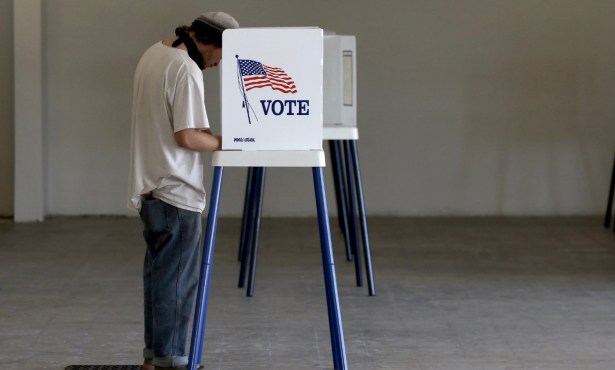Trump Repeals Internet Privacy Protections
President Declares Open Season on Browsing Histories and Click Habits.
Somehow I never worried much about Big Brother rifling through my underwear drawer. I know I should. I feel bad that I don’t. Naturally, I mustered all the requisite indignation expected when it was revealed — post-9/11 — that thousands of card-carrying American citizens had been “inadvertently” spied on by the National Security Agency — without benefit of warrant or due process — during the Regime of George Bush the W.
That was wrong. I made a point to say as much. But my heart wasn’t really in it. Who among us does not crave the sense of self-importance that only comes from being spied upon? No matter how inflammatory I made my emails, no clipped men in rainy black suits — and, yes, Tom Hanks would play both of them when Steven Spielberg got around to making the movie of my life — came knocking on my door. We live in an age of desperate self-affirmation. I clearly did not matter. The therapy bills have been crushing.
That being said, I remember being struck by the indifference to this outrage from Republicans who otherwise proclaimed a quasi-religious devotion to the U.S. Constitution and the principles for which it stands. I understand it has lots of amendments, but fourth from the very top is the one saying no searches or seizures without probable cause. Warrants have to be obtained on which judges have to sign off. That kind of stuff. Their silence was deafening.
Imagine my relief when the Right Side of the Aisle started waking up to such things. The Party of “Lock ’em Up” now cares about how evidence is obtained and even — on occasion — the rights of the accused. It started last year when Democrats — desperate to pass some kind of gun-control law — wanted to ban anyone on the Transportation Safety Administration’s No Fly List of suspected terrorists from buying a gun. Republicans objected — ferociously, I might add — that many on the list had been unjustly accused. My head spun. What planet was I on? The Republicans prevailed. The TSA terrorists would be allowed to buy guns. A new day has clearly dawned, as the case of Donald Trump’s deposed national security adviser Michael Flynn dramatically demonstrates. Flynn got deep-sixed when it became known he failed to report that he’d met on several occasions with Russian ambassador Sergey Kislyak before Trump was sworn in as president. In one of those meetings, Flynn discussed serious sanctions that Barack Obama — in the waning moments of his administration — had imposed on Russia’s Vladimir Putin for interfering in last November’s presidential election. It’s obvious to anyone but a simpleton Flynn assured his Russian counterpart the sanctions would not last. What else could explain Russia’s total lack of response to Obama’s action?
At any other time in American history, Flynn’s conduct would be considered treasonous. Charges would be filed and perps marched. Traditionally, Republicans have led any and all charges where alleged Russki malfeasance has been hinted at. Trump himself was personally mentored by one of the most accomplished Red-baiters of all time, Roy Cohn. Republican response to the Flynn scandal has been heartening, albeit perversely. How is it, Trump and his GOP defenders have thundered, the government knew Flynn was meeting with Kislyak? Why wasn’t Flynn’s name properly “masked,” as proper protocol requires when any American incidentally surfaces in such international security intercepts? These, by the way, are issues civil libertarians cared deeply about when the Bush administration rammed the so-called Patriot Act down the country’s throat in the wake of 9/11. Republicans at the time — with a handful of notable exceptions — could not have been more contemptuous.
For those now expecting Trump and the GOP to exhume and exonerate the fried corpses of Julius and Ethel Rosenberg, dispatched as Russian spies to the electric chair in 1953, don’t hold your breath. Even if the Rosenbergs were infamously framed, they also happened to be guilty. Trump’s civil-libertarian aversion to Big Brother is lamentedly selective and predictably transactional. This Monday — with not a single tweet — Trump signed a law repealing an internet privacy bill successfully ram-rodded through Congress by Obama. The Obama bill would prevent big internet service providers, such as Verizon, Comcast, and AT&T, from strip-mining its customers’ browsing histories and selling the aggregated search and click data to various and sundry internet advertisers unless individual customers gave their explicit and affirmative consent.
One might wonder, what’s the fuss? Don’t Google and Amazon.com already know you even better than your dog does? How much more can your inner sanctum be intruded upon? Apparently, quite a lot.
What Google knows, Facebook might not. It turns out they maintain their own separate silos of excruciatingly personal information about their customers’ keystroke proclivities. Next to God, internet service providers have the most total picture of who we really are. There are no silos. By a narrow margin, the Republican Congress voted to veto these paltry protections to which the internet service provider universe took offense. Such a requirement, they objected, would impede the pace of innovation, as if that means anything. It would, they contend with a perfectly straight face, block consumers from the knowledge they so desperately need to make informed shopping choices.
It goes without saying that these companies would never do anything untoward with such detailed information. Likewise, it goes without saying that their political contributions — to all parties — has been nothing less than overwhelming. Like advertising, campaign donations are, after all, considered free speech. The good news here is that the protections that Trump just revoked hadn’t gone into effect yet. To steal a line from Muddy Waters, you can’t lose what you never had.
Worry about Big Brother?
Why bother?



